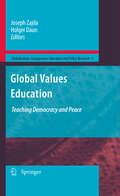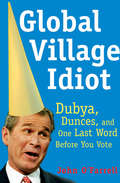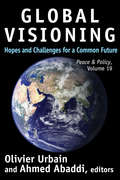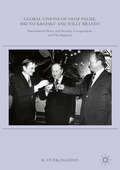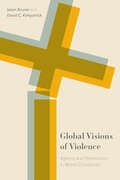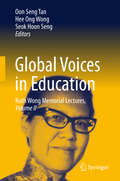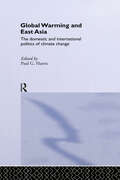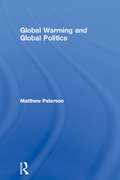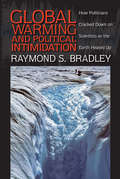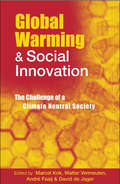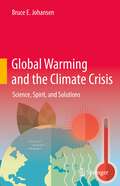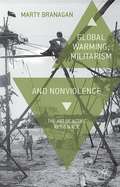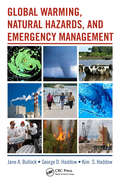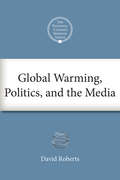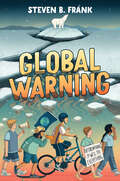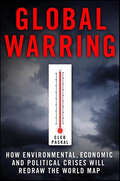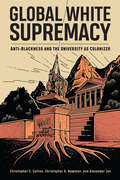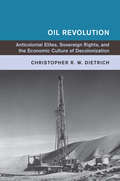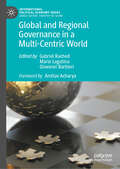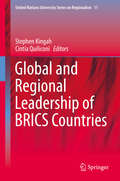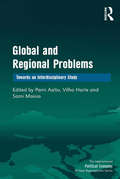- Table View
- List View
Global Values Education
by Joseph Zajda Holger DaunThis, the seventh in the 12-volume series Globalisation, Comparative Education and Policy Research, presents scholarly research on major discourses in values education globally. It is an accessible, practical yet scholarly resource that explores international concerns in the field of globalisation and comparative education. A vital sourcebook of ideas for researchers, practitioners and policy makers in values education, multiculturalism and moral education, the volume also provides a timely overview of current issues affecting values education, comparative education and education policy research in the global culture. Drawing on recent studies in the areas of globalisation, equity, social justice, and the role of the state, the book critically examines the interplay between values education, globalisation, and dominant ideologies, and reflects on its implications for policy. It goes further to explore conceptual frameworks and methodological approaches applicable in the research covering values education, globalisation, equity, and multicultural education. Individual chapters critically analyse the dominant discourses and debates pertaining to values education, multiculturalism and relevant comparative education discourses. In addition, the book evaluates the ambivalent and problematic relationship between the state, its dominant models of values education, globalisation and social change. The authors employ a number of diverse paradigms in comparative education research, ranging from critical theory to globalization. By focusing on ideology, globalisation and democracy, they attempt to examine critically both the reasons for, and the outcomes of, education reforms in the domain of values education, policy change and transformation. In doing so, they provide a more informed critique of Western-driven models of accountability, quality and school effectiveness.
Global Viewpoints: Civil Liberties
by Noel MerinoThis series provides readers with the information they need to think critically about the worldwide implications of global issues; each volume focuses on a controversial topic of worldwide importance and offers a panoramic view of opinions. This title explores free speech and freedom of expression, media freedom and freedom of the press, the right to due process, and the right to privacy; By illuminating the complexities and interrelations of the global community, this excellent resource helps students and other researchers enhance their global awareness.
Global Village Idiot: Dubya, Dunces, and One Last Word Before You Vote
by John O'FarrellWinner of the Best Columnist of the Year at the British Liars’ Awards and Britain’s finest satirist, O’Farrell takes dead aim in Global Village Idiot at cell phones, awards ceremonies, genetic sheep splicers, America’s right wing cabal of dunces, dunderheads, dimwits, and the Big D’ himself. Just when we thought the lawlessness in Iraq was over,” O’Farrell observes, even more blatant incidents of looting have begun. With handkerchiefs masking their faces, two rioters roughly the height of George Bush and Donald Rumsfeld kicked in the gates of the largest oilfield and grabbed the keys of the gasoline trucks. Yee-haw! It’s all ours! Millions of barrels of the stuff’ they laughed. Yup!’ added the leader and this mask guarantees my anonymousinity!’ So after all these years there really is such a person as the Thief of Baghdad. Except strangely his accent sounded vaguely Texan.” A writer for the groundbreaking television show Spitting Image and contributor to the screenplay for the hit movie Chicken Run, O’Farrell meticulously researched his conclusions by spending five minutes on the internet and then giving up.” And while O’Farrell’s sharpest barbs and stingers have often been written to come out of the mouths of grotesque puppets and Claymation chickens, this time around he keeps the best lines for himself: With the election of the 43rd President of the United States, the global village is complete,” O’Farrell writes. ’It has its own global village idiot.’”
Global Visioning: Hopes and Challenges for a Common Future (Peace And Policy Ser.)
by Ahmed AbaddiThis volume makes the case for global visioning: the collective process of looking at a larger picture and building common ground for the future. The contributors agree that only by such a process will people be able to address mounting problems like global warming, war, terrorism, and poverty, which threaten the Earth's population.This latest volume in the Peace & Policy series addresses three main themes. "On Spirituality and Ethics" advocates an international culture of nonviolence. "International and Transnational Relations" makes a case for global fellowship. "On Education and Culture" argues that educating children is the first step in reforming the world. The contributors seek solutions to the question of how people can start seeing issues from a global point of view, rather than from narrow national perspectives.In keeping with the global nature and scope of the world's problems, the contributions come from very diverse countries, including Japan, Morocco, South Africa, Germany, Italy, Belgium, and the United States. This work will inspire participation in this much-needed exercise of collective global problem solving.
Global Visions of Olof Palme, Bruno Kreisky and Willy Brandt
by B. VivekanandanThis book analyses the global visions of Olof Palme, Bruno Kreisky and Willy Brandt, European social democratic statesmen who earned international esteem for their contributions to global developments during the second half of the twentieth century. Their visions encompassed, inter alia, international peace and security, East-West and North- South Cooperation, and other important domains pertinent to developing countries of Asia, Africa and Latin America. In this volume, the author closely examines the advancements Palme, Kreisky and Brandt made and demonstrates how their visions remain valid for shaping the future of mankind.
Global Visions of Violence: Agency and Persecution in World Christianity
by Kate Kingsbury John Corrigan Omri Elisha Joel Cabrita Hillary Kaell Melani McAlister Harvey Kwiyani Candace Lukasik John Boopalan Christie Chui-Shan ChowIn Global Visions of Violence, the editors and contributors argue that violence creates a lens, bridge, and method for interdisciplinary collaboration that examines Christianity worldwide in the twentieth and twenty-first centuries. By analyzing the myriad ways violence, persecution, and suffering impact Christians and the imagination of Christian identity globally, this interdisciplinary volume integrates the perspectives of ethicists, historians, anthropologists, and ethnographers to generate new conversations. Taken together, the chapters in this book challenge scholarship on Christian growth that has not accounted for violence while analyzing persecution narratives that can wield data toward partisan ends. This allows Global Visions of Violence to push urgent conversations forward, giving voice to projects that illuminate wide and often hidden landscapes that have been shaped by global visions of violence, and seeking solutions that end violence and turn toward the pursuit of justice, peace, and human rights among suffering Christians.
Global Voices in Education
by Oon Seng Tan Hee Ong Wong Seok Hoon SengThis book brings together selected lectures given by eminent educationalists in memory of Ruth Wong, an influential figure in the field of education. The lectures represent the powerful ideas seeded by Dr Wong and address the challenges of education in Singapore's journey from a textbook case of poor education to a world-class educational system. The educational standard that we enjoy today was only possible thanks to visionary thinking and missionary zeal. This collection addresses key themes and issues in learning, schooling, teaching, teacher education, educational research and policy innovation, making it a must-read for educators, educational leaders and policy makers interested in providing uplifting education for the next generation of learners.
Global Warming and East Asia: The Domestic and International Politics of Climate Change (Routledgecurzon Studies In Environmental Politics Ser.)
by Paul G. HarrisGlobal Warming and East Asia analyses the domestic politics, foreign policy and international relations of climate change in East and Southeast Asia, The countries of this important region are often disproportionately affected by climate change and, as they expand and develop, their contribution to the problem grows. The contributors investigate the increasingly widespread and disparate efforts to address global warming at international, national and local levels, and in so doing increase our understanding of a region vital to mitigating and coping with climate change. This unique volume includes in-depth studies of China and Japan, two of the most important countries in East Asia with regard to global warming, and examines the role of East and Southeast Asian countries, such as Indonesia and the Philippines, in combating the problem.
Global Warming and Global Politics (Environmental Politics)
by Matthew PatersonExamines the major theories within international relations, and how these can help us understand the emergence of global warming as a political issue.
Global Warming and Political Intimidation: How Politicians Cracked Down on Scientists as the Earth Heated Up
by Raymond S. BradleyGlobal warming is the number one environmental issue of our time, yet some prominent politicians have refused to accept scientific evidence of human responsibility and have opposed any legislation or international agreement that would limit greenhouse gas emissions. A few have gone even further and have tried to destroy the reputations of scientists researching climate change by deliberately undermining the credibility of their research. These politicians have sought to sow seeds of doubt in the minds of the public and to weaken public and political support for the control of fossil fuel use. one scientist who was unwittingly ensnared in a web of political intimidation. In this powerful book, highly respected climate scientist Raymond Bradley provides the inside story from the front lines of the debate. In clear and direct language, he describes the tactics those in power have used to intimidate him and his colleagues part of a larger pattern of governmental suppression of scientific information, politics at the expense of empirically based discourse. Speaking from his experience, Bradley exposes the fault lines in the global warming debate, while providing a concise primer on climate change. The result is a cautionary tale of how politics and science can become fatally intertwined.
Global Warming and Social Innovation: The Challenge of a Climate Neutral Society
by Andre Faaij David Jager Marcel KokSocieties need to reduce emissions of greenhouse gases by 80 per cent in order to counter the risks of climate change. This study envisions a climate neutral society - one where the output of polluting gases is minimised by social innovations set up in households, by local authorities, through developments in information and communications technologies and dematerialization, and through the shift towards product service systems and emissions trading. The work discusses the possibilities for steering and orchestrating this long-term transition towards a climate-friendly society, mapping paths through current dilemmas in climate policy and exploring the legal issues of making this transition.
Global Warming and the Climate Crisis: Science, Spirit, and Solutions
by Bruce E. JohansenThis textbook introduces readers to basic scientific principles of climate change. Based on extensive empirical evidence, it explains weather events that indicate climate change’s evolution and presents important topics connected to climate change, such as political controversies, climate policy, as well as Native American perspectives. Finally, it presents attempted solutions, including policy recommendations and technological proposals for necessary changes in our world.Providing a well-written and easy-to-follow overview of knowledge of science-based geophysical facts, including thermodynamics, the book puts a strong emphasis on why expeditious action on global warming is urgent. The book also explains why smart greenhouse-gas reduction strategies will ignite economic growth, generate new domestic jobs, protect public health, and strengthen energy security.Not assuming a scientific background on the part of the reader, Global Warming and the Climate Crisis: Science, Spirit, and Solutions offers an ideal supplemental reading in many types of courses in Earth sciences, climate policy, climate change sciences, as well as politics of climate change, from high school through undergraduate. General readers also will benefit from its treatment of this very important and timely issue.
Global Warming, Militarism and Nonviolence
by Marty BranaganMilitarism is the elephant in the room of global warming. Of all government sectors, 'Defence' has the highest carbon footprint and expenditure, yet has largely been exempt from international scrutiny and regulation. Marty Branagan uses Australian and international case studies to show that nonviolence is a viable alternative to militarism for national defence and regime change. 'Active resistance', initiated in Australian environmental blockades and now adopted globally, makes the song 'We Shall Not Be Moved' much more realistic, as activists erect tripod villages, bury, chain and cement themselves into the ground, and 'lock-on' to machinery and gates. Active resistance, 'artistic activism', and use of new information and communication technologies in movements such as the Arab Spring and 'Occupy' demonstrate that nonviolence is an effective, evolving praxis.
Global Warming, Natural Hazards, and Emergency Management
by Jane A. Bullock George D. Haddow Kim S. HaddowScientists predict the earth is facing 40-to-60 years of climate change, even if emissions of carbon dioxide and other global warming gases stopped today. One inevitable consequence of the greenhouse gases already in the atmosphere will be an increase in the frequency and severity of natural disaster events. Global Warming, Natural Hazards, and Eme
Global Warming, Politics, and the Media
by David Roberts Eban GoodsteinOn September 21, 2011, David Roberts participated in The National Climate Seminar, a series of webinars sponsored by Bard College's Center for Environmental Policy. The online seminars provide a forum for leading scientists, writers, and other experts to talk about critical issues regarding climate change. The series also opens a public conversation, inviting participants to ask questions and contribute their own thoughts. Roberts is a Senior Staff Writer at Grist, one of the web's most popular sites for environmental news and commentary, so he is distinctively qualified to discuss the relationship between global warming, politics, and the media. In his lecture, Roberts argued that environmentalists' traditional criticism of climate change coverage--namely that journalists describe global warming as a debatable theory rather than as fact--is no longer the issue. Most media accept the reality of climate change--but it is treated as a specialty issue, rather than as a phenomenon that affects myriad aspects of life. The seminar focused on how to change that perception--how to make climate a backdrop to the political debates that affect real change. This E-ssentialis an edited version of Roberts' talk and the subsequent question and answer session. While some material has been cut and some language modified for clarity, the intention was to retain the substance of the original discussion.
Global Warning
by Steven B. FrankA group of 12-year-old friends concerned about climate change proposes a new way to save the earth: amending the U.S. Constitution. Their project propels these activists on an amazing journey across America—and all the way to Norway—with plenty of outside-the-box hijinks and civil disobedience, as they work to save the planet and their futures on it. For sixth grader Sam Warren and his friends Catalina, Alistair, Jaesang, and Zoe, the effects of climate change are too pressing to ignore. Adults don’t seem to be up to the challenge of taking action to make real change, but kids know it’s their futures on the line. If their parents, teachers, and government officials won’t step up well, then, they will! And these young people will stop at nothing to save the planet and their futures on it. With a little help from a retired kids' rights lawyer and a grandma who knows how to march, they are ready to think big: Constitutional amendment big. But can a bunch of 12-year-olds really draft an amendment that protects the planet, get it to pass in Congress, and change enough hearts and minds across the country to get it ratified before the clock runs out? Steven B. Frank crafts another funny and fast-paced story of heightened-reality wish-fulfillment, loaded with the witty patter of smart kids, in this book that reads like Aaron Sorkin for middle grade and plumbs the complexities of the Constitution and the critical turning point of global climate change.
Global Warring: How Environmental, Economic and Political Crises Will Redraw the World Map
by Cleo PaskalIn a perfect storm, the environment, the global economic system and geopolitics are all undergoing rapid, uncontrolled change. In the same way that the climate is in a state of flux, exhibiting erratic behavior before settling into a new norm, in the wake of the global economic crisis, many of the assumptions about the Western economic system have been destroyed, which leads to some troubling questions: How aggressive will water-hungry China become in order to secure a sufficient supply of it? What will happen when climate-triggered conflicts like the one in Sudan spread throughout the continent? As India takes its proper place at the high table of nations and begins large-scale importing of food, what will happen to already shrinking supplies?Global Warring takes a hard look at these questions. Journalist and analyst Cleo Paskal identifies problem areas that are most likely to start wars, destroy economies and create failed states. Examining the most likely environmental change scenarios, she illuminates the ways in which they could radically alter human existence. A fascinating tour through our uncertain future, Global Warring also offers a controversial new way forward for the global economy and the worldwide environmental crisis.
Global White Supremacy: Anti-Blackness and the University as Colonizer
by Christopher S. Collins Alexander Jun Christopher B. NewmanKnowledge is more expansive than the boundaries of the Western university model and its claim to be the dominant—or only—rigorous house of knowledge. In the former colonies of Europe (e.g., South Africa, Brazil, and Oceania), the curriculum, statues, architectures, and other aspects of the university demonstrate the way in which it is a fixture in empire maintenance. The trajectory of global White supremacy is deeply historical and contemporary—it is a global, transnational, and imperial phenomenon. White supremacy is sustained through the construction of inferiority and anti-Blackness. The context, history, and perspective offered by Collins, Newman, and Jun should serve as an introduction to the disruption of the ways in which university and academic dispositions have and continue to serve as sites of colonial and White supremacist preservation—as well as sites of resistance.
Global and International History: Anti-Imperial Metropolis
by Michael GoebelThis book traces the spread of a global anti-imperialism from the vantage point of Paris between the two World Wars, where countless future leaders of Third World countries spent formative stints. Exploring the local social context in which these emergent activists moved, the study delves into assassination plots allegedly hatched by Chinese students, demonstrations by Latin American nationalists, and the everyday lives of Algerian, Senegalese and Vietnamese workers. On the basis of police reports and other primary sources, the book foregrounds the role of migration and interaction as driving forces enabling challenges to the imperial world order, weaving together the stories of peoples of three continents. Drawing on the scholarship of twentieth-century imperial, international and global history as well as migration, race and ethnicity in France, it ultimately proposes a new understanding of the roots of the Third World idea.
Global and International History: Anticolonial Elites, Sovereign Rights, and the Economic Culture of Decolonization (Global and International History)
by Dietrich Christopher R. W.Through innovative and expansive research, Oil Revolution analyzes the tensions faced and networks created by anti-colonial oil elites during the age of decolonization following World War II. This new community of elites stretched across Iran, Iraq, Saudi Arabia, Venezuela, Algeria, and Libya. First through their western educations and then in the United Nations, the Arab League, and the Organization of Petroleum Exporting Countries, these elites transformed the global oil industry. Their transnational work began in the early 1950s and culminated in the 1973–4 energy crisis and in the 1974 declaration of a New International Economic Order in the United Nations. Christopher R. W. Dietrich examines how these elites brokered and balanced their ambitions via access to oil, the most important natural resource of the modern era.
Global and International History: Humanitarian Invasion
by Timothy NunanHumanitarian Invasion is the first book of its kind: a ground-level inside account of what development and humanitarianism meant for Afghanistan, a country touched by international aid like no other. Relying on Soviet, Western, and NGO archives, interviews with Soviet advisers and NGO workers, and Afghan sources, Timothy Nunan forges a vivid account of the impact of development on a country on the front lines of the Cold War. Nunan argues that Afghanistan functioned as a laboratory for the future of the Third World nation-state. If, in the 1960s, Soviets, Americans, and Germans sought to make a territorial national economy for Afghanistan, later, under military occupation, Soviet nation-builders, French and Swedish humanitarians, and Pakistani-supported guerrillas fought a transnational civil war over Afghan statehood. Covering the entire period from the Cold War to Taliban rule, Humanitarian Invasion signals the beginning of a new stage in the writing of international history.
Global and International History: Of Limits and Growth
by Stephen J. MacekuraOf Limits and Growth connects three of the most important aspects of the twentieth century: decolonization, the rise of environmentalism, and the United States' support for economic development and modernization in the Third World. It links these trends by revealing how environmental NGOs challenged and reformed the development approaches of the US government, World Bank, and United Nations from the 1960s through the 1990s. The book shows how NGOs promoted the use of 'appropriate' technologies, environmental reviews in the lending process, development plans based on ecological principles, and international cooperation on global issues such as climate change. It also reveals that the 'sustainable development' concept emerged from transnational negotiations in which environmentalists accommodated the developmental aspirations of Third World intellectuals and leaders. In sum, Of Limits and Growth offers a new history of sustainability by elucidating the global origins of environmental activism, the ways in which environmental activists challenged development approaches worldwide, and how environmental non-state actors reshaped the United States' and World Bank's development policies.
Global and Regional Governance in a Multi-Centric World (International Political Economy Series)
by Maria Lagutina Gabriel Rached Giovanni BarbieriIn a world shaken by constant crises and shifting power dynamics, Global and Regional Governance in a Multicentric World delves into the core of the global governance system, exploring its flaws, its evolution, and the forces seeking to reshape it. As the Western-crafted liberal order faces unprecedented scrutiny, this book provides a timely analysis of how emerging powers - China, Brazil, India, South Africa, and others - are challenging traditional governance models, proposing alternatives that better reflect their values, interests, and aspirations. From Asia to Africa, Latin America to Eurasia, this book examines how these regions, collectively known as “the Rest” or “the Global South,” are responding to the shortcomings of a global system long dominated by Western interests. Through insightful regional studies, the authors highlight how “rising powers” are no longer willing to remain peripheral players; instead, they are pushing for a more inclusive, representative, and effective global framework. Rooted in the latest international relations trends, this book offers an incisive exploration of new governance models emerging in a “multi-centric” world. It raises pressing questions about global stability as follows: Will these rising powers succeed in transforming the global order? How do they envision international cooperation? Can their ideas coexist with established Western powers? Through this work, readers gain a nuanced understanding of the forces shaping tomorrow’s world and the potential pathways for reform. Ideal for scholars, policymakers, and those with a keen interest in world affairs, Global and Regional Governance in a Multicentric World is a compelling call to rethink contemporary global governance and the possible paths of the international agenda in an era where traditional multilateralism is no longer able neither sufficient to address the pressing challenges from our interconnected world.
Global and Regional Leadership of BRICS Countries
by Stephen Kingah Cintia QuiliconiThis book presents a systematic collation of the regional and global dimensions of the leadership role of BRICS countries (Brazil, Russia, India, China and South Africa). It analyses the rising regional and global leadership of BRICS, using specific benchmarks to gauge the nature of this leadership. The elements examined include willingness to lead, the capacity to do as much, and the degree to which the given actor is accepted as a leader both within and beyond its region. The chapters in the book capture the nature of trends in regional and global leadership within the contexts of a changing international order. It is taken for granted that Brazil, Russia, India, China and South Africa are now engineering a unique pool of governance that is seeking alternatives to the current order of global economic and political affairs. The fact that these countries have jointly decided to forge ahead with the BRICS constellation of states that is now taking consequential decisions such as the creation of the BRICS' New Development Bank, is not to be treated lightly. In this book the majority of papers take a step back and systematically analyse the real state of the leadership that is provided by the BRICS on a litany of regionally and globally relevant issues. While no one doubts the fact that these countries have the capacity to provide leadership especially in their various regions on many issues, what remains moot is whether they are willing and capable to do so at the global level. Even in those cases where there is the willingness and capacity, the book argues that the acceptance of such leadership by potential followers is not always a given.
Global and Regional Problems: Towards an Interdisciplinary Study (The International Political Economy of New Regionalisms Series)
by Vilho HarleDistinctive due to explicit and systematically developed links between international relations (IR) and related disciplines, this book addresses global and regional interactions and the complex policy problems that often characterise this agenda. Such enhanced communication is crucial for improving the capacity of IR to engage with concrete issues that today are of high policy relevance for international organisations, states, diplomats, mediators and humankind in general. Whilst the authors do not reject the present IR, they offer a wider research agenda with new directions intended not only for those IR scholars who are unsatisfied with the analytical power of the current discipline, but also for those working on 'international', 'foreign', 'global' or 'interregional' issues in other disciplines and fields of research. In this instance they pay particular attention to linking up with peace research, international political economy (IPE) and cultural political economy (CPE), sociology, political geography, development studies, linguistics, cultural studies, environmental studies and energy research, gender studies, and traditions of area studies.
